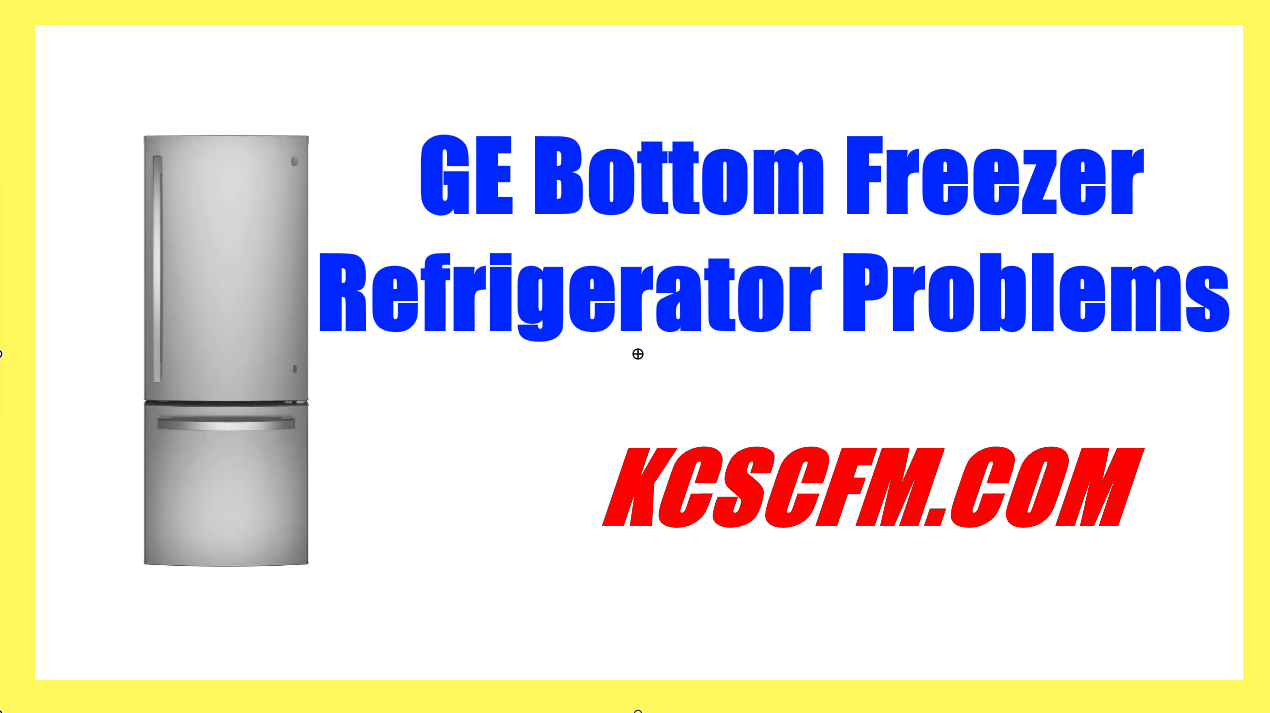GE bottom freezer refrigerators are renowned for their innovative design and efficient cooling technology. Like all appliances, however, they might occasionally run into issues that affect their performance.
At kcscfm.com, we provide insights to understand and resolve these common issues, ensuring your GE appliance operates smoothly.
| Problem | Causes | Fixes |
|---|---|---|
| Inadequate Cooling | Dirty condenser coils, faulty temperature control, frequent door openings | Clean condenser coils, check temperature control settings, limit door openings, ensure proper airflow |
| Excessive Noise | Faulty evaporator fan, loose components, vibration issues | Replace evaporator fan, tighten loose components, address vibration sources |
| Ice Maker Issues | Clogged water line, malfunctioning water inlet valve, faulty ice maker components | Clear clogged water line, replace water inlet valve, repair or replace ice maker components |
| Frost Build-up in the Freezer | Defective defrost heater, malfunctioning defrost timer or thermostat, improper door seals | Replace defrost heater, check and replace defrost timer or thermostat, ensure proper door seals |
| Refrigerator Door Seals | Worn or damaged door seals, misaligned doors | Replace door seals, realign doors |
| Fridge Lighting Issues | Defective light bulbs, faulty light switches, electrical problems | Replace light bulbs, check and replace light switches, address electrical issues |
| Water Dispenser Malfunction | Water line blockage, faulty water valve, dispenser control problems | Clear water line blockage, replace water valve, troubleshoot and repair dispenser controls |
| Problem 8 | Causes for Problem 8 | Possible fixes for Problem 8 |
| Problem 9 | Causes for Problem 9 | Possible fixes for Problem 9 |
10 Common GE Bottom Freezer Refrigerator Problems

GE bottom freezer refrigerator can come with various problems, including inadequate cooling, excessive noise, ice maker issues, frost build-up, door seal problems, lighting issues, and water dispenser malfunctions.
By understanding the possible causes and implementing the suggested solutions, you can troubleshoot and resolve these issues, ensuring the optimal performance of your refrigerator. Remember, regular maintenance and timely repairs are essential for keeping your appliance running smoothly.
Problem 1: Inadequate Cooling
Experiencing inadequate cooling in your refrigerator can be distressing, leading to food spoilage and unnecessary waste.
The causes for this issue range from defective condenser coils to an overly packed fridge obstructing air circulation.
An overfilled fridge can inadvertently block the essential airflow, preventing the refrigerator from maintaining the ideal temperature. A malfunctioning thermostat, a critical component in regulating your fridge’s temperature, might also be at fault.
Cleaning the condenser coils, which are crucial in cooling the refrigerator, can often solve this issue. Dirt and dust can accumulate on these coils over time, affecting their efficiency. Also, rearranging the items in your fridge to improve air circulation can have a considerable impact.
For an in-depth guide on how to diagnose and fix these issues, you can visit the Fridge Compressor Running But Not Cooling page on our site.
Problem 2: Excessive Noise
It’s normal for a refrigerator to emit some operational noises, but excessive or unfamiliar sounds can be a clear indication of a problem.
This problem could be due to a faulty evaporator fan motor or the build-up of ice in the freezer compartment that interferes with the fan’s operation.
One solution is to check the evaporator fan for any visible damage or obstructions. If the noise persists, you might need to replace the fan motor. Another solution involves defrosting the freezer and checking if this resolves the issue.
For a detailed understanding of this issue, you can refer to the Refrigerator Making Knocking Noise article on our website.
Problem 3: Ice Maker Issues
Ice makers are a convenient feature of many modern refrigerators, including GE bottom freezer models. But like all mechanical parts, they can run into problems.
Your ice maker might stop producing ice, produce too little ice, or the ice cubes might be smaller or larger than usual. Possible causes include a malfunctioning ice maker assembly, a clogged water inlet valve, or a faulty water filter.
Resetting the ice maker or replacing the water filter are common solutions. If these don’t work, you may need to inspect and potentially replace the ice maker assembly or water inlet valve.
Check out our guide on GE Ice Maker Not Making Ice for more detailed steps and solutions.
Problem 4: Frost Build-up in the Freezer
Frost build-up in the freezer is another common problem faced by many GE bottom freezer refrigerator owners.
Excessive frost can be due to a defective defrost heater, a faulty defrost timer, or a damaged door gasket that allows warm air to enter the freezer.
To resolve this issue, you can try manually defrosting the freezer. If the problem persists, check the defrost heater and timer for any defects. If required, replace them. Checking the door gasket for any damage and replacing it if necessary could also help.
The article Why The Fridge Is Not Cold But The Freezer Is offers insights into the defrosting process and how to handle frost build-up issues.
Problem 5: Refrigerator Door Seals
The door seal, or gasket, plays a crucial role in maintaining the efficiency of your refrigerator.
A faulty or damaged door seal can allow warm air into the fridge, leading to multiple issues such as frost build-up or temperature instability.
Inspect the gasket for any cracks or tears and clean it thoroughly. If it’s damaged, it’s best to replace it to ensure a good seal.
Problem 6: Fridge Lighting Issues
Lighting issues may not directly affect your refrigerator’s performance, but they can make it difficult to quickly locate items in your fridge.
The cause could be as simple as a blown bulb or a faulty door switch.
Replacing the bulb is a straightforward solution to this issue. If the bulb is in good condition, inspect the door switch. A faulty switch will need to be replaced.
If your refrigerator light stays on, this Fridge Not Cooling But Light Is On guide can offer further assistance.
Problem 7: Water Dispenser Malfunction
A malfunctioning water dispenser can be frustrating, especially on a hot day when you need a quick, cold drink.
This could be due to a faulty water inlet valve, a defective dispenser control board, or a blocked water tube.
A possible solution is to check the water tube for any ice blockages and defrost it if necessary. If the problem persists, you may need to replace the water inlet valve or the dispenser control board.
Problem 8: Refrigerator Overcooling
One issue you might encounter with your GE bottom freezer refrigerator is overcooling – when the refrigerator cools food to such a degree that they freeze.
Overcooling in your refrigerator could be due to a faulty thermostat, a problem with the temperature control board, or a malfunctioning damper control assembly.
You can first try adjusting the refrigerator’s temperature settings. If this doesn’t solve the problem, it’s advisable to check the thermostat and replace it if necessary. If you’re not confident in doing this, it may be time to call in a professional.
Problem 9: Refrigerator Constantly Running
If your refrigerator is running constantly or more frequently than usual, it may be trying to compensate for a problem.
Reasons for this can range from a dirty condenser coil, a defective thermostat, to an issue with the door seal.
First, clean the condenser coils as a dirty coil can cause the refrigerator to work harder to cool down. If this doesn’t help, inspect the door seal and thermostat, replacing any faulty parts as necessary.
Check out this detailed guide on Fridge Compressor Running But Not Cooling for more troubleshooting tips.
Problem 10: Unusual Odors Inside the Refrigerator
Unusual odors inside your refrigerator can be a nuisance and may affect the taste of your food.
This could be due to spilled food, expired products, or inadequate ventilation.
Regularly cleaning your refrigerator and ensuring proper ventilation can help prevent this issue. Using baking soda can also help in eliminating odors.
Conclusion
In conclusion, owning a GE bottom freezer refrigerator comes with its share of potential problems. The most important thing is to be vigilant and to address these problems as soon as they arise. Early detection not only saves you time and effort but can also prevent minor issues from becoming major problems.
Knowledge is power. Understanding your appliance, knowing how to perform basic troubleshooting, and having the confidence to carry out these tasks can be incredibly empowering. It’s why at kcscfm.com, we strive to arm homeowners with practical knowledge and DIY solutions.
Remember, while this guide can help you troubleshoot and even fix some common issues, some problems might require professional attention. If at any point you feel unsure, do not hesitate to call a professional.
Continue exploring kcscfm.com for more DIY fixes and appliance insights.
FAQs
- Why is my GE bottom freezer refrigerator not cooling properly? There could be several reasons, including blocked vents, a malfunctioning thermostat, or a faulty compressor. Try cleaning the vents and adjusting the thermostat settings. If this doesn’t help, seek professional help.
- Why is my refrigerator making a loud noise? This could be due to a faulty evaporator fan motor or ice build-up in the freezer. Check the fan for any obstructions or damage. If the noise continues, consider getting the fan motor replaced.
- What do I do if the ice maker in my refrigerator is not making ice? This could be due to a clogged water supply line or a faulty ice maker assembly. Try resetting the ice maker or replacing the water filter. If the issue persists, inspect the ice maker assembly and the water inlet valve.
- What causes frost build-up in my freezer? This could be due to a faulty defrost heater, a damaged door gasket, or a malfunctioning defrost timer. Try manually defrosting the freezer. If the frost build-up continues, you may need to replace the defrost heater, timer, or door gasket.
- Why is the light in my fridge not working? This could be due to a blown bulb or a faulty door switch. Try replacing the bulb first. If the issue persists, check the door switch and replace it if necessary.
- What causes the water dispenser in my refrigerator to stop working? This could be due to a blocked water tube, a faulty water inlet valve, or a defective dispenser control board. Check the water tube for any ice blockages and defrost it if necessary. If the problem persists, consider replacing the water inlet valve or dispenser control board.
References
For more information and guidance on these and other refrigerator issues, do check out the GE Profile Ice Maker Blinking Green Light and Fridge Compressor Running But Not Cooling pages on our website. Our DIY repair guides are designed to provide homeowners with practical, step-by-step solutions to common appliance problems.

Hi there! I’m Sam Hendricks, and I’m a repair technician and expert. I created this website to help people like you save money and time by fixing your own appliances.
Over the years, I’ve seen people spend a lot of money on unnecessary repairs or replacements. That’s why I decided to share my expertise and create easy-to-follow guides for fixing appliances on your own.
